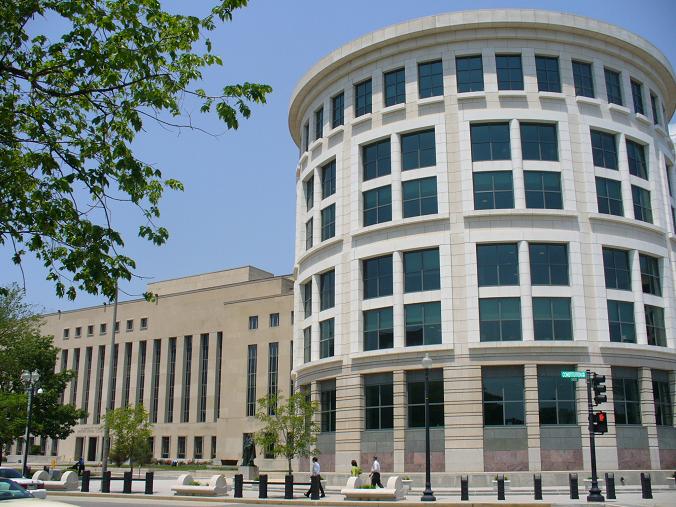Full DC Appellate Court Panel Questions Legality of Trump Tariffs
By Reuters | 31 Jul, 2025
A hearing Thursday before all 11 justices of the US Appellate Court for the DC Circuit could result in a declaration invalidating Trump tariffs.
U.S. appeals court judges sharply questioned on Thursday whether President Donald Trump's tariffs were justified by the president's emergency powers, as lawyers for states and businesses challenging the measures argued he exceeded his authority.
The U.S. Court of Appeals for the Federal Circuit in Washington, D.C., is considering the legality of "reciprocal" tariffs that Trump imposed on a broad range of U.S. trading partners in April, as well as tariffs imposed in February against China, Canada and Mexico.
In hearing arguments in two cases brought by five small U.S. businesses and 12 Democratic-led U.S. states, judges pressed government lawyer Brett Shumate to explain how the International Emergency Economic Powers Act (IEEPA), a 1977 law historically used for sanctioning enemies or freezing their assets, gave Trump the power to impose tariffs.
Shumate said that the law allows the president to have "extraordinary" authority in an emergency, including the ability to stop imports completely. He said IEEPA authorizes tariffs because it allows a president to "regulate" imports in a crisis.
The judges seemed dubious of this sweeping argument.
"IEEPA doesn't even say tariffs, doesn't even mention them," Judge Jimmie Reyna said.
The arguments - one day before Trump plans to increase tariff rates on imported goods from nearly all U.S. trading partners - mark the first test before a U.S. appeals court of the scope of his tariff authority. The president has made tariffs a central instrument of his foreign policy, wielding them aggressively in his second term as leverage in trade negotiations and to push back against what he has called unfair practices.
The court adjourned after about an hour-and-a-half of oral arguments. The judges did not say when they would rule, and the losing side will almost certainly appeal quickly to the U.S. Supreme Court.
Trump, the first president to use IEEPA to impose tariffs, has said the April tariffs were a response to persistent U.S. trade imbalances and declining U.S. manufacturing power.
He said the tariffs against China, Canada and Mexico were appropriate because those countries were not doing enough to stop illegal fentanyl from crossing U.S. borders, a claim the countries have denied.
The states and businesses challenging the tariffs argued that they are not permissible under IEEPA and that the U.S. Constitution grants Congress, and not the president, authority over tariffs and other taxes.
"No trade law in 200 years has been interpreted to give the president this power," Neal Katyal, a lawyer for the businesses, said.
Judge Kimberly Moore challenged Benjamin Gutman, representing the state of Oregon, on his argument that the U.S. trade deficit is not an "unusual and extraordinary" threat that would trigger IEEPA's emergency powers, noting that Trump said the trade deficit contributed to compromised military readiness.
"That bothers me - I'm a little concerned about compromised military readiness," Moore said. "How about you?"
The case is being heard by a panel of all of the court's active judges, eight appointed by Democratic presidents and three appointed by former Republican presidents.
TRADE NEGOTIATIONS
Tariffs are starting to build into a significant revenue source for the federal government, with customs duties in June quadrupling to about $27 billion, a record, and through June have topped $100 billion for the current fiscal year. That income could be crucial to offset lost revenue from Trump's tax bill passed into law earlier this month.
But economists say the duties threaten to raise prices for U.S. consumers and reduce corporate profits. Trump's on-again, off-again tariff threats have roiled financial markets and disrupted U.S. companies' ability to manage supply chains, production, staffing and prices.
On May 28, a three-judge panel of the U.S. Court of International Trade said IEEPA did not authorize tariffs related to longstanding trade deficits.
The Federal Circuit has allowed the tariffs to remain in place while the litigation continues.
The case will have no impact on tariffs levied under more traditional legal authority, such as duties on steel and aluminum imports.
Trump's Department of Justice has argued that limiting the president's tariff authority could undermine ongoing trade negotiations, while other Trump officials have said that negotiations have continued with little change after the initial setback in court.
The president recently announced trade deals that set tariff rates on goods from the European Union and Japan, following smaller trade agreements with Britain, Indonesia and Vietnam.
Trump has set an August 1 date for higher tariffs on countries that don't negotiate new trade deals.
Mexican President Claudia Sheinbaum said on Thursday that Trump would pause new tariffs set to go into effect on the U.S.'s southern neighbor and a 90-day period to work on a trade deal.
(Reporting by Jan Wolfe in Washington and Dietrich Knauth in New York; additional reporting and writing by Luc Cohen in New York; Editing by David Bario, Noeleen Walder, Leslie Adler, Deepa Babington and Nick Zieminski)

The DC Circuit Court of Appeals was established in 1990.
Asian American Success Stories
- The 130 Most Inspiring Asian Americans of All Time
- 12 Most Brilliant Asian Americans
- Greatest Asian American War Heroes
- Asian American Digital Pioneers
- New Asian American Imagemakers
- Asian American Innovators
- The 20 Most Inspiring Asian Sports Stars
- 5 Most Daring Asian Americans
- Surprising Superstars
- TV’s Hottest Asians
- 100 Greatest Asian American Entrepreneurs
- Asian American Wonder Women
- Greatest Asian American Rags-to-Riches Stories
- Notable Asian American Professionals

